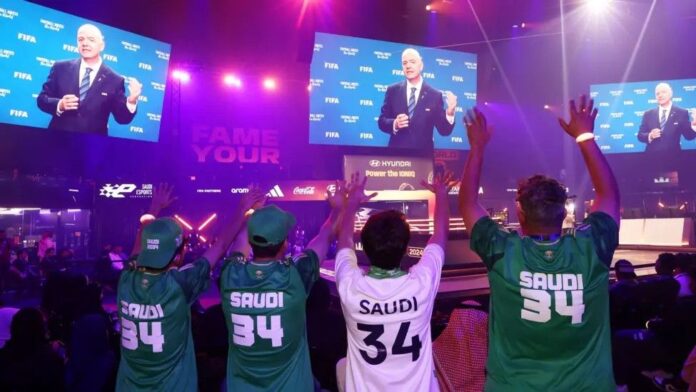
|
Getting your Trinity Audio player ready...
|
Saudi Arabia’s deepening ties with global football take center stage as the Kingdom bankrolls a new era for the FIFA Club World Cup—and sets the stage for the 2034 World Cup.
A Billion-Dollar Bet on Football
Saudi Arabia is playing a pivotal role in reshaping the global football landscape, and nowhere is this more evident than in the revamped FIFA Club World Cup. Without the financial firepower of Saudi Arabia’s Public Investment Fund (PIF), the upcoming summer tournament in the U.S. may have looked drastically different.
The Kingdom’s backing—via an alleged $1 billion deal involving sports streaming platform DAZN—has stirred controversy, particularly as it coincides with Saudi Arabia’s successful, unopposed bid to host the 2034 FIFA World Cup.
A Controversial World Cup Selection
In December, FIFA confirmed Saudi Arabia as the host for the 2034 World Cup, just days after announcing a major commercial deal with DAZN. The selection raised eyebrows. Australia’s decision to pull out of the bidding race, citing FIFA’s tight deadlines, essentially cleared the way for Saudi Arabia’s appointment.
FIFA limited bids to Asia and Oceania, despite the fact that the 2022 World Cup was held in Qatar. Critics argue this restriction—combined with an unusually fast evaluation process—virtually guaranteed Saudi Arabia’s success.
The Kingdom was later ratified without a traditional vote—only Norway abstained, citing a lack of transparency.
Ethics, Investment, and Allegations of Sportswashing
Campaigners like Nicholas McGeehan of Fair Square have blasted FIFA’s handling of both the Club World Cup and the 2034 World Cup bidding. “This deeply flawed process was designed to ensure Saudi Arabia won,” he said. He pointed to the simultaneous broadcasting deal with DAZN—partly owned by the Saudi PIF—as a sign of political and financial coordination.
Former FIFA president Sepp Blatter, still banned from football, echoed this sentiment: “Without Saudi’s investment, the Club World Cup in the U.S. wouldn’t be happening. It’s $1 billion from Saudi Arabia that made the DAZN coverage possible.”
FIFA’s Response: A Global Growth Strategy
FIFA denies the tournament is overly reliant on Saudi money. A spokesperson said nine sponsors are now on board and emphasized the importance of global game development.
“This new competition is in the best interests of football,” FIFA stated. “All profits will be redistributed through prize money and a $250 million solidarity program.”
FIFA also argued the tournament isn’t responsible for calendar congestion, as it will be held once every four years.
DAZN: Betting Big on Streaming Supremacy
Pete Oliver, CEO of DAZN’s emerging markets division, defended the $1 billion investment, calling the Club World Cup a “fantastic opportunity” for the platform to expand globally.
“This will be the most streamed sports event ever,” Oliver claimed, citing rapid growth in South America and the Middle East.
Asked about PIF’s investment, Oliver insisted there was no political motive. “We’re an independent company… not a pawn in a geopolitical game.”
A ‘Marriage of Convenience’ or a Strategic Play?
One senior football association source called Saudi’s involvement in the Club World Cup a “marriage of convenience.” They argued FIFA needed financial help and Saudi Arabia needed global credibility in football, particularly with local clubs like Al-Hilal participating and Al-Ahli already qualified for the 2029 edition.
While Qatar struggled to convert World Cup hosting into local football engagement, Saudi Arabia sees this tournament as a vehicle to build its footballing profile ahead of 2034.
Strategic Goals: Beyond Football
Sources close to the Saudi government describe the investment as part of Vision 2030—a broader economic plan to diversify income, boost tourism, and modernize society through sport.
Saudi Arabia aligns with FIFA president Gianni Infantino’s belief that developing football industries outside Europe could double the sport’s global GDP to over $500 billion annually.
The Road Ahead: Bigger, Bolder, and More Controversial?
Reports suggest FIFA is already exploring a 48-team format for the 2029 Club World Cup, echoing the expanded men’s and women’s World Cups. DAZN’s Oliver supports the idea, provided team quality remains high.
However, such expansion is likely to face pushback. Player unions warn of burnout, while environmental groups criticize the carbon footprint of expanding from seven matches in one city to 63 matches across 11.
A Turning Point or a Tipping Point?
Saudi Arabia’s deep pockets have brought the Club World Cup back to life—but at what cost? Whether this marks a golden opportunity or a dangerous overreach depends on who you ask.
Either way, football is changing—and Saudi Arabia is right at the heart of it.
